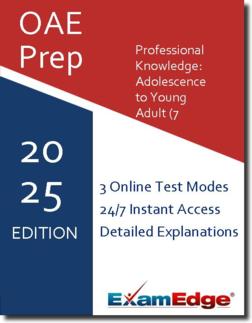OAE Professional Knowledge: Adolescence to Young Adult (7-12 (003) Practice Tests & Test Prep by Exam Edge - Test Reviews
Based on 28 Reviews
- Real Exam Simulation: Timed questions and matching content build comfort for your OAE Professional Knowledge: Adolescence to Young Adult (7-12 test day.
- Instant, 24/7 Access: Web-based OAE Assessment of Professional Knowledge Adolescence to Young Adult (7-12) practice exams with no software needed.
- Clear Explanations: Step-by-step answers and explanations for your OAE exam to strengthen understanding.
- Boosted Confidence: Reduces anxiety and improves test-taking skills to ace your OAE Assessment of Professional Knowledge Adolescence to Young Adult (7-12) (003).

OAE Professional Knowledge: Adolescence to Young Adult (7-12 (003) Practice Tests & Test Prep by Exam Edge - Review
OAE Assessment of Professional Knowledge Adolescence to Young Adult (7-12) - Reviews
Excellent
Based on
140
reviews
“ Today, I took my test and passed with confidence. I took it the first time and failed, but after purchasing this study guide, I was provided with resources that allowed me to take the test and get through it without being nervous. A lot of the questions that were provided in this study guide were si ...
Read More
Stephanie , Ohio
“ Studied a practice test everyday, and passed my test!
Gracyn, Clinton, Ohio
“ Great program to study from. Audio and images REALLY boosted my understanding of subjects.
Cherish , NEWARK, OH
See why our users from 154 countries love us for their exam prep! Including 28 reviews for the OAE Professional Knowledge: Adolescence to Young Adult (7-12 exam.
Exam Edge is an Industry Leader in Online Test Prep. We work with our Institutional Partners to offer a wide array of practice tests that will help you prepare for your big exam. No Matter how niche field of interest might be, were here to help you prepare for your test day.
| 2.8M | 4.5M | |
| Users | Tests Taken | |
| 100K | 19 | |
| Unique Exams | Years in Business | |


